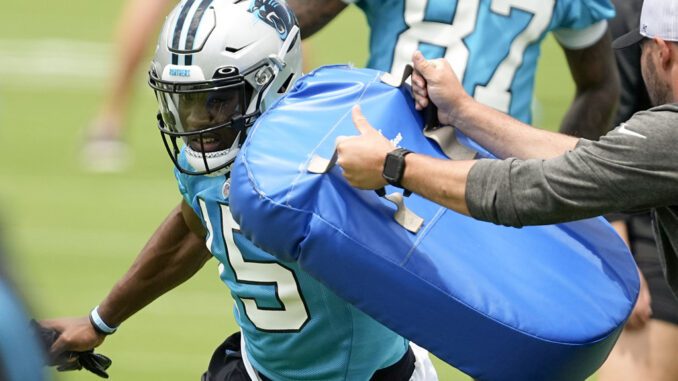
The NFL schedule release has become a major event on the offseason calendar. What used to be a press release memo is now a televised two-hour special, along with a frenzy of activity from social media teams across the league.
The schedule’s rise in stature has come at a time when the difficulty in producing it has steadily declined.
“The process has evolved so much,” said NFL Vice President of Broadcast Planning Mike North, who has spent more than a quarter century with the league. “Back in the old days, we literally used to build the schedule by hand. We’d select key games for prime time and hang them on the peg board. Then we’d start building the schedule a week at a time.”
Obviously, the process was riddled with starts and stops.
“You’d get to like Week 6 or 7,” North recalled, “and you’d realize, ‘Uh oh.’ The only way to keep going and finish Week 6 is to go down to Week 15 and take that game you had earmarked for ‘Monday Night.’ So you pull it up just to keep going, and now you’ve compromised the ‘Monday Night’ schedule. So you patch that hole and then realize in Week 7, ‘Uh oh, the only way to keep going is to take that Sunday game.’”
Then there was the fact that teams tend to make big roster decisions at the same time the league was working on the schedule. North recalled the Donovan McNabb trade, Peyton Manning’s decision to sign with Denver, and a certain quarterback who kept fans waiting when he left New England for Tampa, then false started a few times before retiring as events that sent the schedule-makers into a frenzy of moving games on the peg board.
Technology has relegated the old peg board to a storage room, however.
“The software and hardware have evolved, and we’re doing stuff they never would have envisioned 15 or 20 years ago,” North said. “We can press a button and sort of start over every day.”
That was useful this year when Aaron Rodgers and Lamar Jackson made big decisions about their futures late in the offseason and several teams, including the Panthers, brought in new quarterbacks in the draft.
“Not only do you factor in trades, but you also pull in new quarterbacks,” he said. “You have a team like Carolina now making sense going side-by-side on ESPN if Bryce Young is going to be the quarterback. It’s a way to showcase your up-and-coming stars.”
Sure enough, the NFL has placed the Panthers’ home opener against the Saints in prime time as one of two of ESPN’s “Monday Night Football” games getting the national spotlight in Week 2. It’s Carolina’s first “Monday Night” game since December 2018 and the first time the home opener has been on “Monday Night” since 2004.
It’s one of two prime time appearances for Young and the Panthers this year. Carolina’s game at Chicago in Week 10 will be part of the league’s “Thursday Night Football” package.
The Panthers’ schedule also shows evidence of another major change in the NFL’s model that technology has allowed. In the old days, other than the prime time games, teams knew what network they’d be on. Fox had the NFC package and CBS the AFC. When teams played the opposite conference, the road team determined the network that would carry the game.
Not anymore.
“For the first time, every game was a free agent,” said the Chief Operating Officer of NFL Media Hans Schroeder. “All 273 games were up for grabs and could go in any window (on any network). … You look at a team like Washington, and you could expect 14 of their 17 games to be on Fox. This year, we’re going to have seven Washington games on CBS.”
Similarly, the Panthers see a divergence from the usual steady diet of 1 p.m. Fox Sunday games this year. At least five games (Week 3 at Seattle, Week 6 at Miami, Week 9 against the Colts, Week 13 at Tampa and Week 17 at Jacksonville) will be on CBS, and several games either have starts in the 4 p.m. hour or have yet to be determined.
Highlights of the schedule include a season opener at Atlanta, giving the Panthers back-to-back division games to start the schedule. After the Week 3 trip west, they host the Vikings, then go to Detroit before heading to Miami prior to their Week 7 bye. Following the week off, the Panthers host back-to-back games against Houston and Indy. Dallas comes to Bank of America Stadium in Week 11, followed by three straight road games before Carolina returns to Charlotte to host Atlanta. The Panthers get a Christmas Eve home game against the Packers and spend New Year’s Eve in Jacksonville before closing out the regular season at home against Tampa.
It’s a new-look schedule, with a mixture of networks and start times, fitting for a team that will also be sporting a new look on the field with Young at quarterback.
It’s an exciting time, perhaps exciting enough that no one will miss the pegboard.



